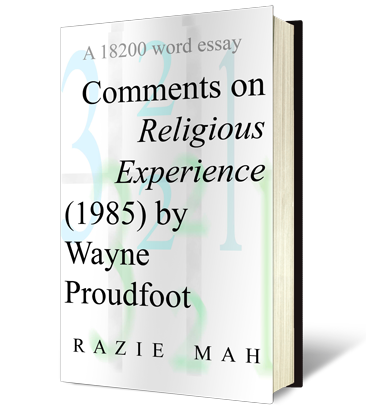About the Author
When one reads ‘about the author’, one does not expect an avatar or an anima. Or, perhaps one should.
Why?
The world is a dangerous place.
Still, Razie Mah wants to imagine the Fourth Age of Understanding.
Why?
The Age of Semiotics has begun.
‘Semiotics’ is the study of triadic relations, including signs.
So, what is Razie Mah a sign of?
The sign-vehicle tells a story.
The first name, Razie, points to both Iranian and Jewish mysticism.
For Iranians, the thirteenth century al-Razi wrote The Highway Men of God and a mystical commentary of the Quran. Al-Razi was one of the disciples of the medieval sufi-master Najm al-Din Al-Kubra. Al-Razi fled central Asia into Persia ahead of the fateful Mongol invasion.
For Jews, Raziel is an archangel of mystical fame. A keeper of secrets, an angel of mysteries, he is full of bookish intrigue.
The last name, Mah, derives from the same root word that accounts for the English word “moon”. In Zoroastrian cosmology, the animal world is in the care of Mah. Mah reflects the one who gives, without us knowing why.
Razie Mah, then, is a fiction stepping out of a fiction. In An Archaeology of the Fall, there is a certain precision to his appearance. Despite all his book learning, he cannot solve the riddle placed before him. He humbly admits his limitations. Yet, in his struggle, he reminds us of the masterwork of riddles, Oedipus Rex. What is the key to this incredible work?
Perhaps, Razie Mah’s authorial presence speaks to those who are not prepared to step out of the fictions in which they are written, particularly, the fiction of Progressivism and the fiction of a Caliph-building Islam. Can we ever be ready for this historical moment? I think not. Yet we feel the winds, moving over the waters.
Our historical moment mirrors another moment, when a great Persian king, Cyrus, in 539 B.C., stepped out of the Assyrian-inspired fiction that "empire" meant ruthless. He issued a decree for the restoration of Judah and the Temple.
This inspired decree set in motion the construction of, not so much a temple, but a book. The Torah is a foundation for many souls and a fountain for Jewish, Christian and even, Islamic, imaginations.
What a gift! A gift full of irony and hope. A gift of history and illusion. A gift that brought us The Gift. The Gift did not go unpunished. And in that sacrifice, God loves.
Today, this avatar and anima says to the Persians and the Medes: Thank you. Open the books and see. We need your kindness and your imagination, again.

